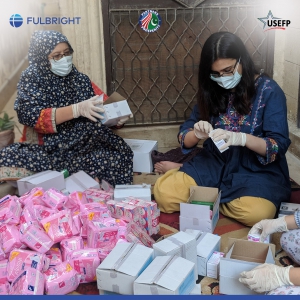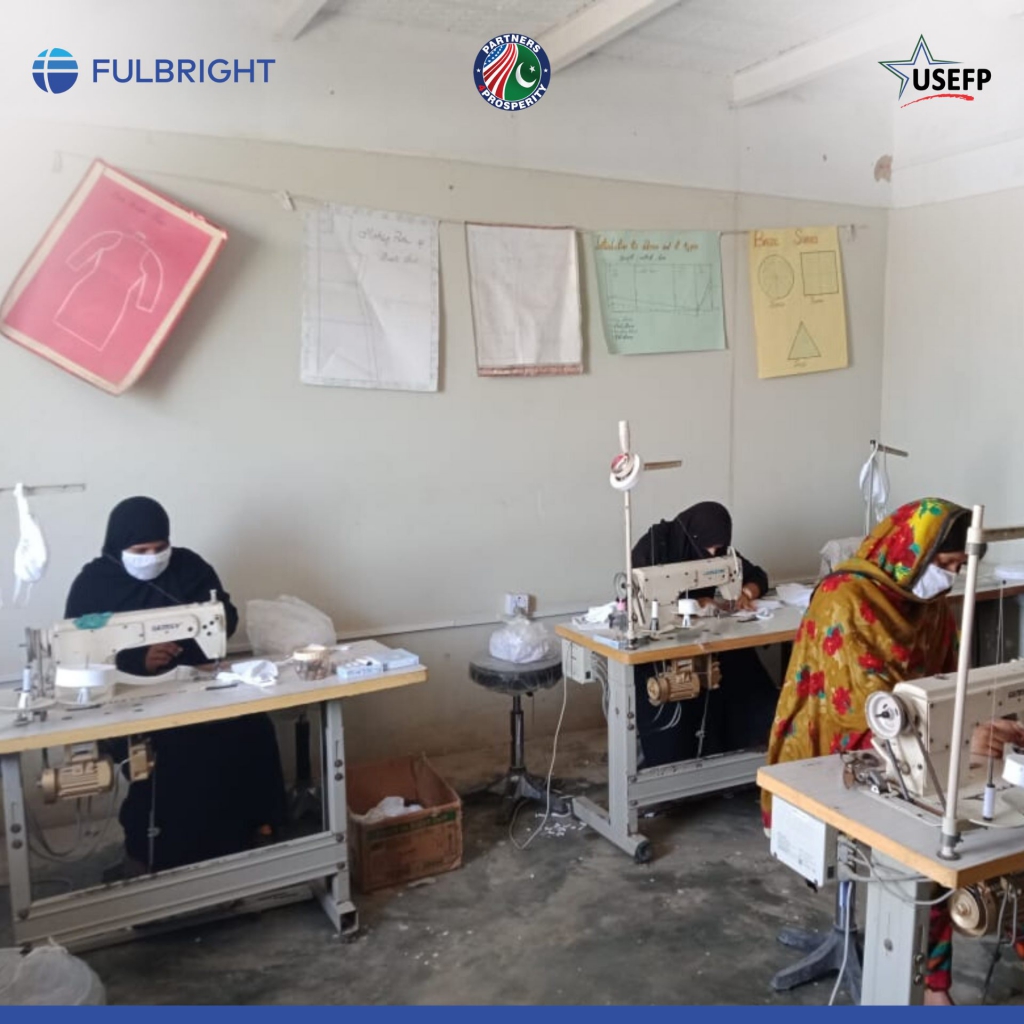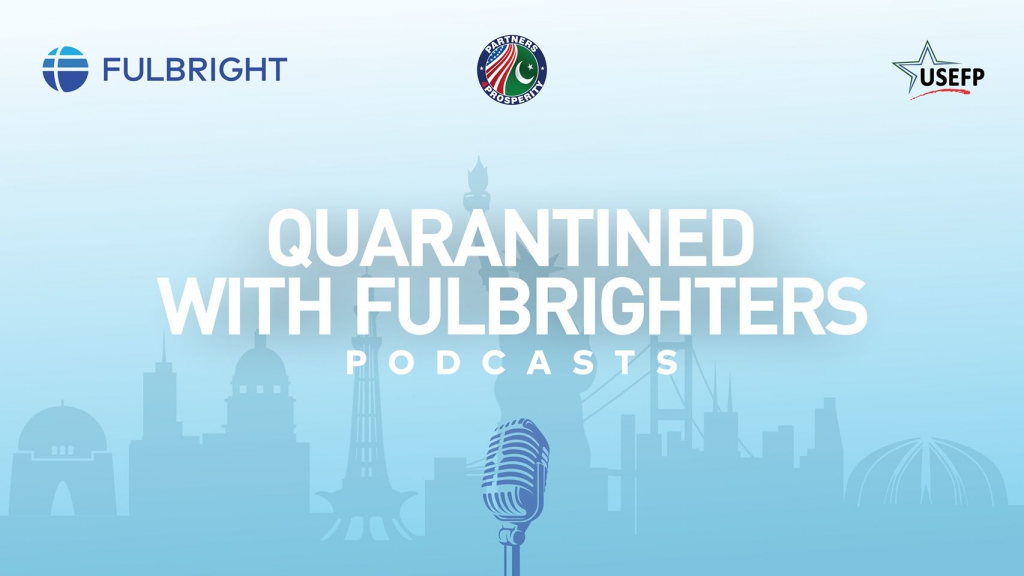The Covid-19 health crisis, which brought the world to a standstill, also elicited extraordinary compassion and selfless acts of service from healthcare professionals, as a well as ordinary citizens. As in past crises, Fulbright alumni have been at the forefront of efforts to manage the pandemic and its fallout in Pakistan. During the lockdown, USEFP launched a podcast series titled “Quarantined with Fulbrighters” to bring audiences public interest information from Fulbrighters working on the forefront of the pandemic.
The series consists of six episodes, hosted by Fulbright alumnus and stand-up comedian, Shehzad Ghias. Two of the episodes featured medical professionals Dr. Muhammad Moiz and Dr. Mekaiel Zia, who each described their experience of being at the frontline during the pandemic. Dr. Moiz, who helped the Sindh government establish the country’s first Covid-19 drive-thru testing facility in Karachi, is a medical doctor and holds a master’s in public health from George Washington University. While talking to Ghias, Dr. Moiz explained how his Fulbright experience helped him in coming up with an effective strategy for dealing with the pandemic. He shared best practices, the need for community engagement to curtail the spread, and access issues vis a vis the virus in Pakistan.
Dr. Mekaiel Zia is adapting WHO and CDC guidelines across Shifa International Hospitals for Covid-19 in Pakistan and is the primary Public Health Liaison for his organization during this pandemic. He holds a master’s in public health with a focus on health policy and management from Emory University on the Fulbright program. Dr. Zia shared his experience from the frontlines, discussing how hospitals and healthcare workers are managing patient care, why Covid-19 is so contagious, which preventive measures work, and how medications such as Dexamethasone are giving hope for treatment.

Aisha Memon’s Baithak is working to promote awareness about the sexual and reproductive rights of women in Pakistan
The podcast also spoke to alumni who have been running philanthropic initiatives and have contributed to the pandemic through donation drives and efforts to influence policy changes. One of the episodes featured Aisha Memon who is leading a movement to include menstrual hygiene products in ration packs being distributed by aid organizations to communities affected by Covid-19. She is the founder of Baithak – Challenging Taboos, an initiative which works for sexual and reproductive health and rights of girls and women in Jamshoro, Sindh. Memon is a Fulbright alumna holding a master’s in social policy from University of Pennsylvania. While speaking to Ghias, she discussed how the lockdown caused many women in Pakistan to lose access to menstrual hygiene products, primarily due to loss of income and mobility. She spoke about her decision to work primarily in Jamshoro, Sindh, the kind of issues related to the sexual and reproductive health of women in Pakistan, and the culture of silence that surrounds these topics. Memon also discussed the formative experience of pursuing a master’s in social policy on a Fulbright scholarship, and how it was a dream come true for her.
Another Fulbrighter who has been actively contributing to the Covid-19 response in the country is Sidra Nizamuddin. Nizamuddin graduated with a master’s in quantitative and computational finance from Georgia Tech on the Fulbright program. Recently, she and her partners have distributed 744 coveralls, 402 face shields, 2,000 surgical masks, and 66 surgical gowns to medical workers on the front lines at public hospitals in Islamabad (PIMS), Rawalpindi (Holy Family), Quetta, Multan, Peshawar, AJK, and District Headquarters Hospitals at Mianwali, Talagang, Essa Khel, Jhelum, Okara, D.G. Khan, D.I. Khan and Chakwal. Nizamuddin is also the founder of Center for Labor Research which aims to promote labor rights awareness in Pakistan. On the podcast she discussed the labor rights situation in Pakistan post-Covid-19, and the extensive research her organization has undertaken to provide accurate and reliable data on the that impact of the pandemic on different industries.
Salima Hakim Khan, works for Charter for Compassion – Pakistan, an aid organization dedicated to serving communities in need. She holds a master’s in public policy from University of Texas at Austin. Talking to Ghias, she spoke about social development issues in Pakistan, how she witnessed the impact of such development projects in her own community in Hunza, and her own Fulbright journey. She discussed how she has been working on projects in education, healthcare, and women empowerment, one of which resulted in women trainees at Mumkin’s community center in Orangi, Karachi producing and distributing over 55,000 free face masks to the public.

Salima Hakim with the help of women empowerment program (Mumkin) trainees, has produced 55,000 masks by mobilizing existing resources
Featured on another episode was Hashim Kaleem, an educationist and consultant currently teaching young students at private high schools and undergraduate students at LUMS, and consulting for the World Bank assisting the Government of Punjab on education policy. Kaleem spoke about the impact of Covid-19 on students and educational institutions, and his own recovery after contracting the virus in Lahore. He has studied international education policy from Harvard University while on a Fulbright scholarship.
The podcast can be accessed on USEFP’s official Facebook page and YouTube channel.
